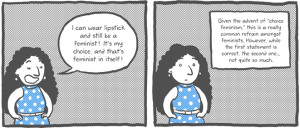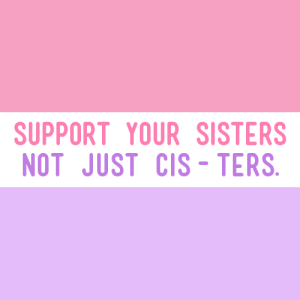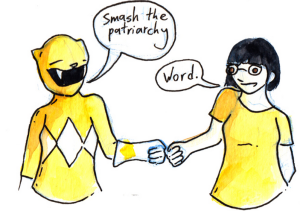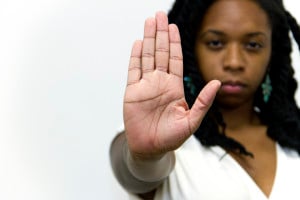I know it probably makes me a weirdo to want to talk about white privilege so much, but I actually enjoy conversations on this topic – even with people who disagree with me.
Sure, these conversations can get heated, uncomfortable, and downright aggravating. But they’re also necessary in order for white folks and people of color to understand each other’s experiences.
So let’s do this – let’s talk the gritty details of what racism does to people’s lives, be honest about the biases and shame we’ve internalized, face the uncomfortable truth about living in a society dominated by white supremacy.
But if, at any point, you’re tempted to oversimplify these complex issues and just be defensive – then let’s not. I’ve lost patience for those defensive reactions that just try to deny the impact of white privilege.
They have nothing to do with thinking critically about the issues or trying to understand each other’s experiences – and they make no damn sense.
And unfortunately, I’ve got way too many examples to choose from, so here’s one to make my point more clear.
I was talking with friend about whether or not he’s benefited from white privilege. I’ve known him for years, so I understood his perspective – he grew up in a low-income household with constant financial worries, and he couldn’t grasp how he could possibly be privileged in one way and struggling in another.
It was a hard, but productive exchange. I sympathized with his feeling that his struggles were invisible. He listened to how my identity relates – I’m marginalized as a queer Black woman, but I have able-bodied and cisgender privilege. We were reaching a deeper understanding of the complexity of these issues.
Until his roommate joined us. This guy had an argument I’ve heard many times before.
“We have a Black president!” he declared, as if that definitive statement meant we should throw the whole idea of white privilege out the window.
He saw Barack Obama as an exception to the rule – one Black man among the 43 white ones who’d gotten the most powerful position in the country. This, he believed, proved that Black folks saying racism is a problem are just complaining about nothing.
The conversation shut down at that point. We went from sharing our experiences, trying to understand each other, and engaging deeply with the issues to arguing about whether or not Black folks should just quit complaining and be more like the president.
It made no damn sense.
I know white privilege can be hard to grasp.
I know being white doesn’t mean you’ve had it easy. I get that you, too, have experienced oppression through classism, homophobia, ableism, or any number of forces.
And because of this, I know that my perspective on white privilege might be a difficult one to understand, and that conversations about the topic can be uncomfortable and distressing.
But I want us to actually be able to have those conversations – to honor the complexities of our truths without nonsensical, defensive reactions getting in the way.
Here are some of the reactions I hear all the time in conversations on white privilege. Let’s unpack them so we can move on to engaging more deeply with issues about race.
1. ‘You’re the Real Racist for Talking About Race’
Ah, the old “whoever smelt it, dealt it” approach to race. Like the childhood game of figuring out who farted, this reaction avoids blame, pointing the finger back at me.
It’s not a very accurate fart detection system, but I don’t want embarrassed eight-year-olds to come after me, so I’ll stick to addressing how it applies to race.
I know exactly when I reached my breaking point with this argument: After Dylann Roof murdered nine Black people at a church in Charleston, South Carolina.
This man had only one goal in mind – to kill Black people. He spoke of wanting to “start a race war,” followed white supremacist groups, believed racist propaganda saying Black people are dangerous and inferior to white people.
There is no question that this act of terrorism was about race.
And still, many people focused on Roof’s mental health, rather than his racism. Comment after comment on articles with connections to racism said things like “Why are you making this about race? You’re the real race-baiters!”
Let’s get this straight.
We have Group A: People like Dylann Roof, violent racists who fantasize about and commit violence against people of color.
We have Group B: People who don’t believe they hold racist views, but who are complicit in the system of white supremacy because they don’t do anything to stop it.
But instead of those two groups, you want to blame Group C, the people who are naming what’s happening and trying to put a stop to it, for causing racism?
The blame just doesn’t stick to the people working to solve the problem – that would be like blaming your mechanic for the car problems they’re trying to fix.
Actually, it’s way worse – because you’re saying people of color who are fed up with, and terrorized by, racism should just shut up and deal with it or they’re the ones to blame.
That’s fucked up.
It may be hard, but come on – as adults, we should be able to own up to what we’ve done, whether it’s passing gas or laughing at a racist joke. Taking responsibility and making change is going to take some deeper engagement than “whoever smelt it, dealt it.”
2. ‘Just Don’t Talk About Racism and It’ll Go Away’
This is the idea that we anti-racists are missing the key to solving racism: Just stop talking about it.
I’ve got lots of questions for people who say this. One question is: Have you ever tried to solve a problem by pretending it didn’t exist? How did that work out for you?
Hopefully, this isn’t your approach to fixing a leaky roof, changing a flat tire, or working out relationship problems, because I can promise you that this strategy doesn’t work – and it doesn’t solve racism either.
For one thing, this doesn’t give anti-racist activists nearly enough credit. Our work is based on decades – centuries, even – of generations spent directly suffering through, studying, and overcoming oppressive conditions.
It is simply absurd for someone who’s never walked in our shoes to come along and say, “Hey, have you thought about just pretending racism doesn’t affect your life?”
Can you imagine telling Rosa Parks that she’ll eventually get to the front of the bus if she just shuts up about being forced to sit in the back? She knew she had to take action to have any hope for change – and activists of today haven’t forgotten that lesson from her and so many other change-makers.
Sure, talking about racism is uncomfortable. And maybe you’d feel more content if you got to forget that it exists.
But while you stay silent, people of color suffer with the impact of racism every single day. Only direct action can change that. Don’t insult us by saying things would be better for everyone if we just kept our mouths shut.
3. ‘I Don’t Have This Experience, So It Must Not Be True’
Are you noticing a pattern? These responses silence people of color and prioritize white folks’ voices as more important.
Like arguing that because you can’t relate to an issue, it must not really be an issue.
You’re telling me that, even though you have no experience with this, you’re sure I must be wrong about my own experience.
Excuse me if I’m more than a little insulted by your attitude. How much do you have to doubt my intelligence – and the intelligence of all people of color – to believe you automatically know better than we do when you don’t have a clue about the issue we’re addressing?
This dismissive attitude is also a dreadfully limited way of seeing the world. If you think the only things true in this world are the things you’ve experienced, then you’re missing out on learning about a whole world of experiences that are different from yours.
You and I have different lives, and that’s okay – and I’m smart enough to understand my own experience without your skepticism casting doubt until you get firsthand confirmation.
Living different lives doesn’t mean either of our experiences are invalid. Don’t let the simple fact that we’re different people get in the way of understanding each other.
4. ‘I Don’t Understand This, So It Must Not Be True’
There are a lot of things I don’t understand – like the appeal of skydiving. I’m terrified of heights and I really don’t get why someone would willingly throw themselves out of a perfectly good plane.
But the fact that I don’t understand it is no reason to dismiss the people who do.
If someone told me, “I love skydiving,” I wouldn’t reply with, “But I don’t understand how you could possibly enjoy such a thing, so you must be lying.”
But unfortunately, this is how a lot of people respond to issues of racism.
Say you’re tempted to say, “I don’t understand cultural appropriation – that would mean I can never enjoy anything from another culture, and that’s just silly.”
Here’s a different suggestion: Ask questions. Do research.
Learn more about the issue, instead of dismissing it. Lots of people have written about why cultural appropriation is a problem, and how it differs from respectful cultural exchange. You’ll learn that your reason for dismissing the issue – the suggestion that you can “never” enjoy elements of other cultures – just doesn’t hold true.
If a scaredy cat like me can grasp that some daredevils actually enjoy jumping out of planes, surely you can accept that there are some things about racism that you don’t understand, but they’re still valid.
5. ‘But I’m Not a Bad Person’
Look, I’m sure you’re swell. Now that I’ve acknowledged this, can we move on to what white privilege is really about? Because it has nothing to do with judging your character.
Yes, having white privilege means getting unearned benefits that people of color don’t have. Yes, that means you can contribute to people of color’s struggles without even meaning to.
But no, that doesn’t mean you’re a bad person. It only means you’re human, just like the rest of us, because all of us are part of the system of white supremacy.
Say you and I walk into the same store. You browse unbothered and leave when you don’t see anything you like. I get a security guard keeping me company, and have to open my bag before I exit to prove I didn’t steal anything.
You’ve benefited from white privilege, but you didn’t do anything that makes you a bad person. And even if you did act on racism – say you stereotyped me, too – calling for you to take responsibility for your actions isn’t about judging your character.
In this case, it’s about acknowledging that everyone has implicit biases because white supremacy influences our perceptions. I’m just saying that you, like everyone else, have some biases to unlearn.
Don’t make the mistake of thinking only the Dylann Roofs or the KKK members of the world are capable of contributing to racism. You can be a good person and still be part of the problem.
6. ‘I Never Enslaved or Colonized Anyone, So White Privilege Has Nothing to Do With Me’
Some white people take discussions of white privilege as a personal attack. So they defend themselves from blame:
“How can I have white privilege? I never owned slaves.”
“You’re shaming me for being white.”
“You’re limiting my freedom!”
If your idea of “freedom” includes being able to oppress other people, then we’ve got bigger problems. Anti-racism is about fighting for liberation – for all of us to be free to be who we are.
“Shaming” you for being white is very different than pointing out your contributions to the system of white supremacy.
Think of it this way: Slavery was not just a minor mistake that our country easily moved on from once we realized it was wrong.
It was a major part of the foundation of our country, integral to how we developed race relations between Black and white people. It completely dehumanized Black folks, and only a major revolution could get rid of it.
Even after slavery ended, its practices continued with indentured servitude, and influenced life in the US through segregation, mass incarceration, and everyday discrimination.
So of course slavery’s influences remain – they’ve been benefiting white people and destroying the lives of Black people for centuries.
Today’s examples of white privilege may not include keeping Black folks as property, but they’re still a big deal.
7. ‘I Know an Exception to the Rule’ (Or ‘My Black Friend Said Something Different’)
I have to wonder what white privilege deniers would do if they didn’t have Barack Obama or Oprah Winfrey to point to. Maybe they’d have to realize the realities of everyday Black folks can’t be invalidated by just two people?
Then again, you’ve always got that Black guy you knew in high school – you heard he’s never had a problem with police, so police brutality must not be an issue. Or your cousin’s co-workers wife, who’s Asian and doesn’t mind questions about where she’s from. And don’t forget that Latina you once found in a YouTube comments section, who takes hypersexual stereotyping as a compliment.
The existence of exceptions to the rule is no reason to dismiss the experiences of so many others, and talking about white privilege doesn’t mean saying that every single white person has one experience, and every single person of color has another.
Once again, it’s about talking about a system that disadvantages groups of people.
You could take any issue – say, “positive” racial stereotypes – and find lots of different people of color with varying experiences with it. Some would say that so-called “positive” stereotypes dehumanize them. Some would say these stereotypes just make them laugh.
When Kai Cheng Thom wrote about being a “bad” example of an Asian, she didn’t bother trying to prove that every single Asian person suffers as a result of “good Asian” stereotypes, because that’s not the point.
It would be a shame to miss her really important points about “positive” stereotypes as a weapon of white supremacy just because you know an exception to the rule.
8. ‘Aren’t There More Important Things to Worry About?’
A comprehensive list of white privilege examples would include lots of seemingly “little” things, because white privilege shows up in a variety of ways. Some are so horrendous that they make the news, while others go by without any recognition.
You may think only the “big” things are worth caring about. When people are losing their lives to racist violence, does a microaggression like “you’re so articulate” really matter?
First, let’s establish here and now that it’s possible to care about more than one thing.
Talking about microaggressions doesn’t mean losing passion for stopping threats to Black lives.
Also, you wouldn’t think the so-called “little” things are so little if you understood how they connect with larger issues.
People perpetuate the conditions leading to violence every day – like with the assumption that Black people don’t ordinarily have the intelligence to be “articulate.”
And most of the time, the person saying “Aren’t there more important things to worry about?” isn’t worrying about those “important things” anyway. They’re not taking a break from Black Lives Matter activism to tell me to drop the issue of microaggressions and march against police brutality.
Instead, they’re exploiting the issue of police brutality – something they’re not actually doing anything about – to say my everyday experiences with racism don’t matter. It’s disgustingly insensitive.
9. ‘You’re Too Angry About This’
Is there really such a thing as “too angry” about issues of oppression? This is another response sometimes couched in claiming to “care” about the movement – saying you’d be willing to listen if only people weren’t so upset about this whole racism thing.
When I consider the context of how awful racism is, then think about the fact that people of color are being told to “calm down” about it, I seriously doubt that this response is really about strengthening the call for racial justice.
This is about tone policing – focusing on the emotion of the message, rather than the message itself, and discrediting anyone who doesn’t make the effort to be “nice” about the fact that they’re being oppressed.
Let’s review how it feels to be oppressed. It can be, at various times or all at once, dehumanizing, demoralizing, infuriating, terrifying, bewildering, anxiety-provoking, and more.
And if that’s not enough, then I’m tone policed about it, which is insulting, frustrating, and invalidating.
So trying to get people of color to “calm down” about racism is not going to help. It’d be much more supportive to listen and understand that our emotions make sense, given the circumstances.
10. ‘There’s No Such Thing as Race’ (Or ‘I Don’t See Color’)
“There’s no such thing as race” is the ultimate derailment – and I have to wonder how this would fly for other problems.
“I’m sad because my grandpa died.” “There’s no such thing as death!”
“I’m having a bad day.” “There’s no such thing as bad!”
“That guy just stole my car!” “There’s no such thing as ownership!”
Sure, we can have philosophical conversations about any of these things – what it means to die, what we miss in good and bad binaries, whether we really own material possessions or if ownership is an illusion.
But now is not the time.
Similarly, when it comes to when it comes to young black men being 21 times more likely to be killed by police than young white men, now is not the time to pretend skin color doesn’t make a difference. Clearly, society treats people differently based on race, and we need to talk about it.
Related to this is the claim that you “don’t see color.” There are lots of problems with the colorblind approach, and one of them is that it fails to recognize the reality we’re living in.
Race does matter. We are not all the same, and that’s okay – it doesn’t mean we’re unequal.
Consider this quote by poet activist Audre Lorde, who was proud to identify as a Black lesbian woman: “It is not our differences that divide us. It is our inability to recognize, accept, and celebrate those differences.”
Without These Reactions, What Can You Do Instead?
I’m not trying to shut down your questions or participation in conversations on white privilege. Like I said, I’m all for talking about these issues, and I think we could have some awesome conversations if we engaged more deeply with them.
So instead of reacting defensively, you can help foster productive conversations with these strategies:
1. Ask Questions
Questions help you understand where other people are coming from. Instead of assuming a person of color is lying because you can’t relate, give them the benefit of the doubt and ask for more info about what their experience means to them.
For example, if I tell you it’s racist when white people touch my hair, please don’t say, “I’m not offended when people touch my hair. It’s not about race. You’re just being oversensitive.”
You’ll learn a lot more (and avoid insulting me) if you say, “I had no idea that was such a big problem. Can you tell me more about how it connects to racism?”
Then I can explain – and luckily for both of us, I’ve written a whole article just to help you understand.
2. Do Your Own Research
Asking questions is great, but expecting people of color to do all the work for you is not. Finding answers yourself is just a Google search away.
Like these examples show, issues of race and white privilege are complicated, and you’re not going to get it all from just one person’s comment. So if there’s something you don’t understand, look for more information before you decide to dismiss it.
There are probably many resources (lots right here on Everyday Feminism!) with in-depth analysis on what you’re missing.
3. Get Used to the Fact That People Have Different Experiences Than You
Equality isn’t about sameness – trying to make everyone the same is the opposite of liberation.
So in conversations on white privilege, you’re going to come across experiences that are different from yours. You’ll hear ideas from outside of your frame of reference.
Don’t dismiss what’s different. Listen and learn about what you don’t already know. The more you learn about systems of oppression, the more you’ll realize that some parts of racism are invisible, and it takes paying attention and expanding your worldview to understand them.
4. Practice Sitting with Uncomfortable Feelings – Because This Isn’t Supposed to Be Comfortable
Emotions like anger and guilt aren’t fun to deal with. But difficult feelings are inevitable in conversations about racism.
Many people lash out defensively and shut the conversation down when they feel uncomfortable.
If you can examine what has you feeling uncomfortable instead of trying to escape it, you might learn something from your discomfort.
5. Direct Your Anger at Systems of Racism, Not the People Trying to Fight Them
The next step after recognizing where your anger comes from is doing something about it.
You’re not powerless. Once you learn how to name what’s going on, you can learn what it takes to address it.
Remember that it’s not people of color talking about racism who are creating these problems – we’re just naming and fighting them. You’re invited to join the fight, too – but first, you’ll have to drop the defensive reactions getting in the way.
[do_widget id=’text-101′]
Maisha Z. Johnson is the Digital Content Associate and Staff Writer of Everyday Feminism. You can find her writing at the intersections and shamelessly indulging in her obsession with pop culture around the web. Maisha’s past work includes Community United Against Violence (CUAV), the nation’s oldest LGBTQ anti-violence organization, and Fired Up!, a program of California Coalition for Women Prisoners. Through her own project, Inkblot Arts, Maisha taps into the creative arts and digital media to amplify the voices of those often silenced. Like her on Facebook or follow her on Twitter @mzjwords.
Search our 3000+ articles!
Read our articles about:
Our online racial justice training
Used by hundreds of universities, non-profits, and businesses.
Click to learn more




















